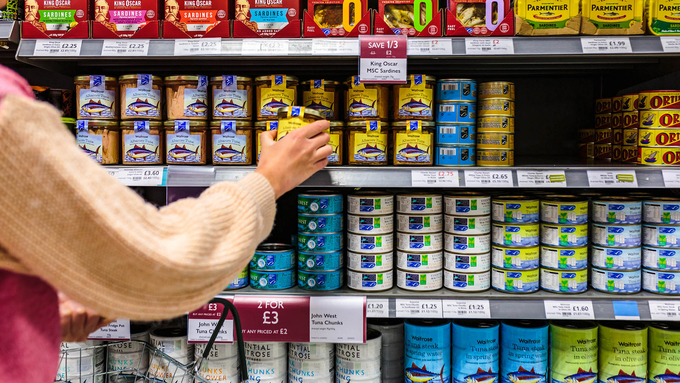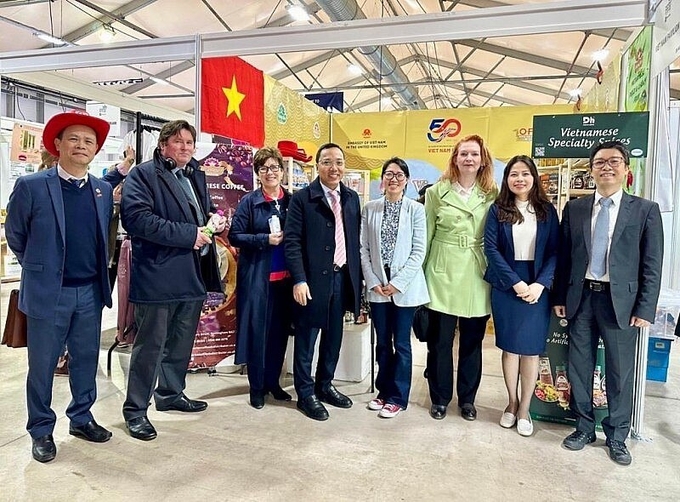November 22, 2025 | 19:30 GMT +7
November 22, 2025 | 19:30 GMT +7
Hotline: 0913.378.918
November 22, 2025 | 19:30 GMT +7
Hotline: 0913.378.918

Tuna exports to the UK are on a downward trend.
The Ministry of Industry and Trade said that thanks to the UKVFTA, import taxes on fresh and frozen tuna products exported from Vietnam to the UK will benefit. Specifically, the tax rate for frozen tuna loins or fillets will be eliminated in 3 years, from 18% to 0%.
Processed tuna used for canned tuna applies a basic rate of 24% and will be reduced in 7 years. Canned and packaged tuna, the annual duty-free quota is 11,500 tons. After that, the tax rate will return to the original 20.5% and be reduced by 3.5% yearly.
Vietnamese seafood products must prove their origin to enjoy these incentives, with regulations applied similarly to the EVFTA.
Accordingly, raw, semi-processed and processed seafood exported from Vietnam must be of pure Vietnamese origin, meaning they are born or raised, caught and processed entirely in Vietnam, and cannot be imported from a third country.
In the UK market, tuna is processed and sold in many products such as sushi, sauce, cake, or bread... Of which, canned and bagged tuna is consumed the most. Sushi or breaded tuna also tends to increase.
However, Vietnam mainly exports frozen tuna meat and loins (HS code 03), accounting for 92%. After Korea, Vietnam is currently the second largest non-EU country supplying this product to the UK market. However, starting in 2023, the UK would reduce imports of this product.

British consumers love seafood products, including tuna.
These developments have caused Vietnam's tuna exports to the UK to show signs of slowing down after a period of good growth. According to statistics from the Vietnam Association of Seafood Exporters and Producers (VASEP), in the first 6 months of 2024, tuna export turnover to this market reached USD 3.6 million, down 5% compared to the same period in 2023.
With the habit of using seafood products at least once a week with an average amount of 150 - 200 grams/person/week, the UK is considered a "golden market" for seafood, especially fish products.
With great potential and plenty of room, the decline in market share and export value in the UK market is a problem. The Import-Export Department (Ministry of Industry and Trade) assessed that tuna is always the top choice of British consumers regarding processed and canned products.
In the UK, tuna is mainly used in fast food, such as sandwiches, or many meals when traveling. In a 2022 survey, about 70% of British people chose tuna as their favorite canned product.
In addition, due to the characteristics of fatty fish that are quite suitable for many forms of processing, some products made from tuna, such as salads, side sauces, bread, etc., are also very popular in the UK market.
Like other European countries, consumers in the UK also pay great attention not only to the origin and quality of the product but also to factors related to labor, environment, or the sustainability of the value chain in the production and supply of products.
Some other factors such as price, processing method and similarity in meals, and place of use are also of interest.

Mr. Nguyen Canh Cuong (far left) at the Vietnam booth at the Balfora Fair.
Mr. Nguyen Canh Cuong, former Trade Counselor in the UK, said that to increase the value of tuna exports to the UK, businesses must build their brands and have appropriate market access strategies.
"The business style and consumer tastes of each market segment have different cultures, religions, and origins in the UK. In particular, the brand of a product or business must have a meaning in English, be easy to pronounce, and be easy to remember. If it can be associated with a famous film, it can be accepted by consumers," he said.
The British are generally quite meticulous, according to Mr. Cuong. Therefore, businesses in the UK often focus on placing orders from partners who have successfully exported to at least one Western European country. Thus, if a business has successfully entered the German, Dutch, or French markets, it will receive more attention from British businesses.
In addition to choosing the right market segment and distribution channel for the product and scale, businesses also need to devote resources to understanding the tastes and characteristics of the market while diversifying export products and increasing deeply processed products.
The Import and Export Department recommends that if the product already has a brand, it should approach the specialized retail market segment for a higher price. However, the accompanying requirement will be stable product quality.
This is very different from distributing through branded retailers in the UK. Typically, these distributors will package under their brand or sell raw products.
Among the main competitors of Vietnamese tuna, Ecuador has signed an FTA with the UK. Basically, Ecuadorian tuna also has tariff incentives similar to Vietnam's.
VASEP assessed that Ecuador's tuna catch is always more significant. Thanks to its powerful fleet, Ecuador's supply of tuna of pure origin is relatively abundant - a prerequisite for taking advantage of tax incentives.
In addition, Vietnam also faces a disadvantage regarding the size limit of skipjack tuna that is allowed to be exploited. Enterprises do not have enough supply of skipjack tuna - the primary raw material for processing canned tuna - of pure origin for export.
Translated by Huong Giang
/2025/11/21/4309-2-153400_128.jpg)
(VAN) Green and low-emission rice is paving the way for Vietnamese rice to enter high-end markets, marking the beginning of a transformation journey toward greening and elevating the national rice brand.

(VAN) ‘Right to Win’ outlines a national action plan that shapes a new vision for Viet Nam’s agriculture in an era of renewal and global integration.

(VAN) Lam Dong’s farmed sturgeon output this year is expected to reach 2,300 tons, worth VND 450 billion, affirming the brand’s position on the market.

(VAN) A surge in Ukrainian egg exports, largely driven by soaring sales to the UK over the last few years, has notably pushed up egg prices on the domestic market.

(VAN) The price of Arabica Catimor coffee in Quang Tri is currently at VND 25,000–27,000/kg (fresh cherries), the highest level ever recorded

(VAN) 'From the coffee story, we can think deeper and further about the crop production sector - from development orientations and value-chain organization to international integration,' assessed Dr Le Quoc Doanh.
/2025/11/18/2431-0-161627_248.jpg)
(VAN) Viet Nam accounts for 43% of the world's export volume of Robusta coffee. However, the Vietnamese Robusta coffee brand has yet to gain broad recognition on the global market.